For decades, Judi Dench was one of the most familiar faces in British film and theatre. Today, the Oscar winner explains that it is no longer other people who fail to recognise her in the street… but rather she who can no longer clearly distinguish the people around her. The cause: age-related macular degeneration, a condition that attacks central vision and is progressing very quickly in her case.
Discover our latest podcast
Diagnosed in 2012, the actress now lives with vision so impaired that she can no longer identify her family and friends. In a British television interview, alongside her long-time friend Sir Ian McKellen, she described a world reduced to outlines and silhouettes. She can still make out McKellen’s shape, which she knows by heart, but beyond this close circle, faces blur. As a result, she sometimes finds herself warmly greeting complete strangers, convinced she knows them.
This situation also leads to misunderstandings. Some people assume she is being aloof or pretentious when she does not respond to a wave. In reality, she simply cannot see who is in front of her. One can sense, between the lines, the embarrassment this creates: how do you maintain normal relationships when you have to guess who is speaking to you?
When reading a script becomes mission impossible
The loss of vision has inevitably shaken her career. She can no longer watch television comfortably, read a book or decipher the pages of a script. For an actress who has built her legend on the precision of her performance and her ability to take ownership of complex texts, it is an earthquake.
Judi Dench has explained that she has always relied on a very visual memory: she learns her lines by remembering their exact place on the page. Without sharp vision, this whole learning system collapses. She has admitted that, in these conditions, preparing a role is now almost unmanageable. She remains convinced, however, that she will eventually find an alternative method, even if the road ahead is long and frustrating.
In practice, her film appearances have become much rarer. In 2022, she still made a playful cameo in the film Spirited alongside Will Ferrell and Ryan Reynolds, then took on a role in the drama-comedy Allelujah with Jennifer Saunders, David Bradley and Derek Jacobi. Since then, she has not appeared again on the big screen and confirmed in 2023 that she had no new acting projects planned.
In May 2024, at the Chelsea Flower Show, she explained that she had tried to work as much as possible despite the disease, but admitted that every new role is now a puzzle. The demands of memorising and finding her way through a text are no longer compatible with her current level of vision. That has not stopped her from taking part in lighter, better adapted projects, such as a recent Christmas advert made for the humanitarian organisation ShelterBox, filmed with her friend Imelda Staunton, whom she met on the series Cranford.
Shaken independence and the fear of being alone
Beyond film sets, her whole daily life is being reshaped. Judi Dench has revealed that she can no longer leave her house on her own. The risk of tripping, bumping into things or falling is too high. She needs to be accompanied at all times, a major upheaval for a woman long seen as independent and hyperactive.
As a guest on Trinny Woodall’s podcast Fearless, she admitted feeling anxious at the idea of being alone and no longer feeling able to stay at home without someone by her side. She has never liked solitude; with her current vision, she dreads it even more. This new dependency, both physical and emotional, is one of the heaviest consequences of her illness.
One can also imagine the mental load of every outing: needing help to find her bearings in space, worrying about crowds, fearing she will not recognise people who come up to her. In this context, the presence of close friends such as Ian McKellen or Imelda Staunton plays a crucial role, offering her a safe and caring environment. They help her remain visible and active, while respecting her visual limitations.
A dynamic conclusion
Through her candid accounts, Judi Dench shines a light on a reality often left unspoken: macular degeneration is not just about “seeing less well”. It affects work, social connections, self-confidence and even the desire to leave home. Yet behind the stark reality, the actress still lets a form of resilience show through: she says she wants to keep looking for solutions, adapt the way she works and perhaps focus on shorter or different types of projects.
Her film career appears to be on pause, but her voice still carries a powerful message about ageing, loss of independence and the ability to reinvent oneself. And it is hard not to wonder: if anyone can turn this ordeal into a new kind of performance, might it not be Judi Dench?
Read more:
Bashar al-Assad and his wife Asma: where do they live today with their three children?
David Cameron shares prostate cancer journey and backs targeted screening
Donald Trump breaks silence on social media health speculation after a quite long weekend
Sources used:















